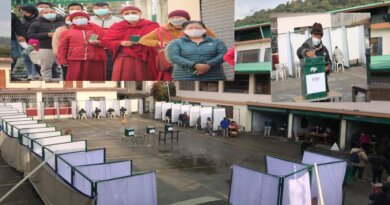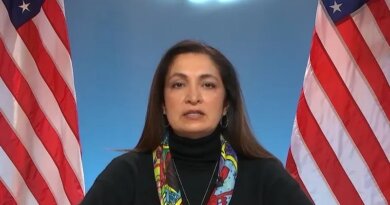Former Political Prisoner Testifies, Urges Unity in Exile for Tibet’s Freedom
By Tsering Choephel

DHARAMSALA, 22 April: Namkyi, a former Tibetan political prisoner, testified during a press conference organised by the Central Tibetan Administration at Lhakpa Tsering Hall on 19 April, detailing her experiences, describing the events that led to her protest, recounting the hardships she endured while incarcerated in a Chinese prison, narrating her escape into exile after being released, and highlighting the critical situation in Tibet.
Namkyi and her relative Tenzin Dolma planned the protest a month before they staged it. On 21, October 2015, they marched together on a road in Ngaba locally known as ‘martyr’s road’. “We both wore Tibetan attire, holding two large portraits of His Holiness the Dalai Lama in our hands, marched in the crowd on the ‘martyr’s road’ of Ngaba, for ‘Free Tibet’, ‘long live His Holiness the Dalai Lama and Kirti Rinpoche, and their swift return to Tibet,’” she said.
Less than 10 minutes into the protest march, police officers arrived and arrested both Namkyi and Tenzin Dolma, placing them in a detention centre in Ngaba. Later, they were moved to a detention centre in Barkam, where they were subjected to rigorous interrogation in an excessively heated room.
“Different interrogators asked various questions such as who incited us to instigate the protest, who started the discussion, where we got the portraits of the Dalai Lama, and whether we had any acquaintances from outside. The interrogators slapped and kicked us repeatedly, saying that we were dissidents and we should know what a terrible crime it is,” she said.
They were held at the detention centre of Tashi Gyalkaling for seven months. In November 2016, after being detained for one year and one month without a trial, the Chinese authorities put them on trial in Trochu County. “Not a single family member of ours was present in the courtroom, only two government-appointed lawyers: a Chinese woman and a Tibetan woman. We were each sentenced to three years on trumped-up charges of undertaking ‘separatist acts against the nation’ and supporting ‘the Dalai clique,’” she added.
Following their sentencing, Namkyi and Tenzin Dolma were imprisoned at the largest women’s prison in Chengdu, China. While in prison, they faced torture and underwent mandatory “military training,” “patriotic education,” and learning of the Chinese constitution.
In the Chinese prison labour camps, Namkyi said she worked at a copper wire production site while Tenzin Dolma was tasked with making cigarette boxes. Both were later moved to a wristwatch manufacturing camp in the prison. “Later, we learned that our family had sent us food and clothes to the prison, but we couldn’t receive anything. We faced problems due to malnutrition, cold in thin blankets during winter, and discrimination against nationalities,” she said.
On 21 October 2018, as they completed their prison sentence, they were released but held at the police station of Pema Lhathang in Ngaba for a week. The Chinese authorities called their family to write a promise letter for their release
“My family was put on a blacklist because my elder brother was also in prison. Despite our release, our expressions and movements were severely restricted, putting anyone we were in contact with at risk.” Being blacklisted by the Chinese authorities entails heightened-targeted restrictions and loss of other rights and opportunities. Tsering Kyi, aunt of Namkyi, was summoned by the Chinese authorities several times for interrogations.
On 13 May last year, Namkyi and her aunt Tsering Kyi secretly escaped from their hometown and reached Nepal on 27 May. On 28 Jun, they arrived a the reception centre in Dharamshala.
Namkyi, during her address, expressed disheartenment at observing regional disunity among Tibetans in exile and said, “Our Tibetan patriots suffering in Chinese prisons would feel sad if they learned about such disunity in exile.” She appealed to fellow Tibetans to unite in the cause of fighting for Tibet’s freedom.





